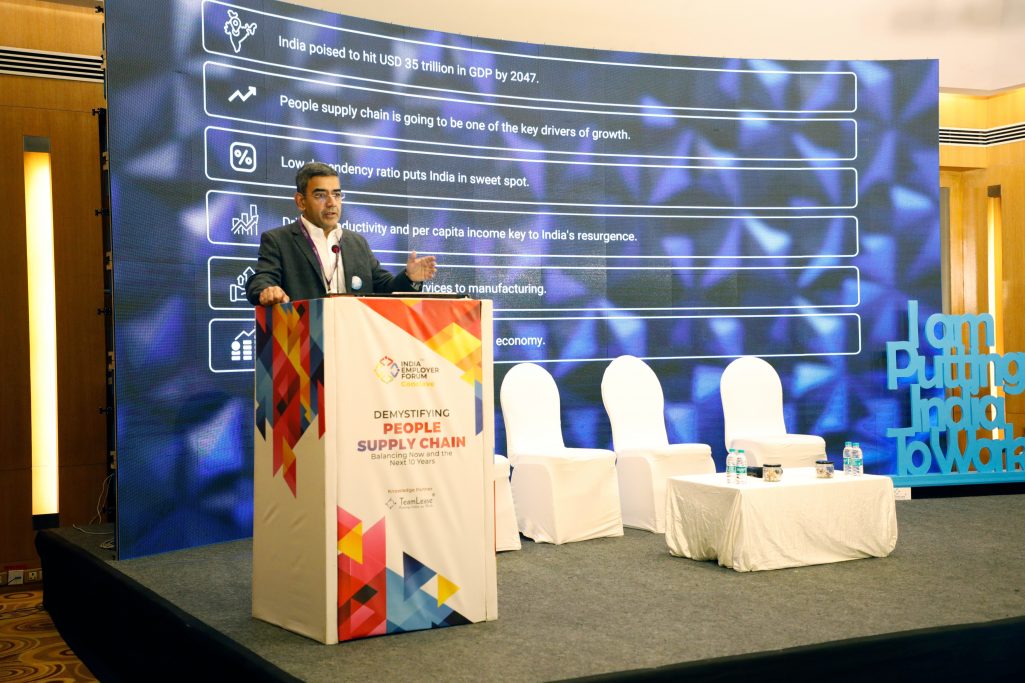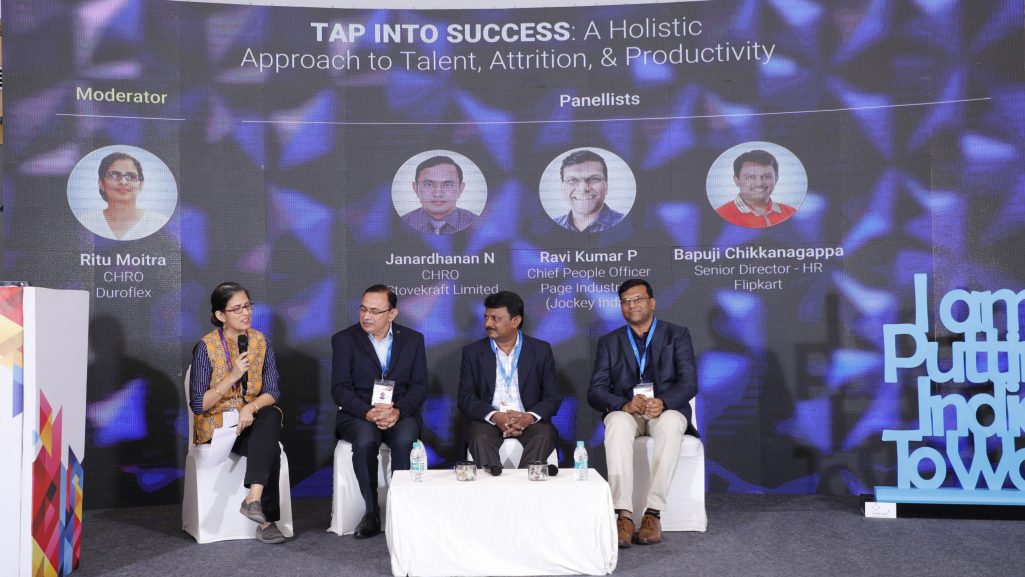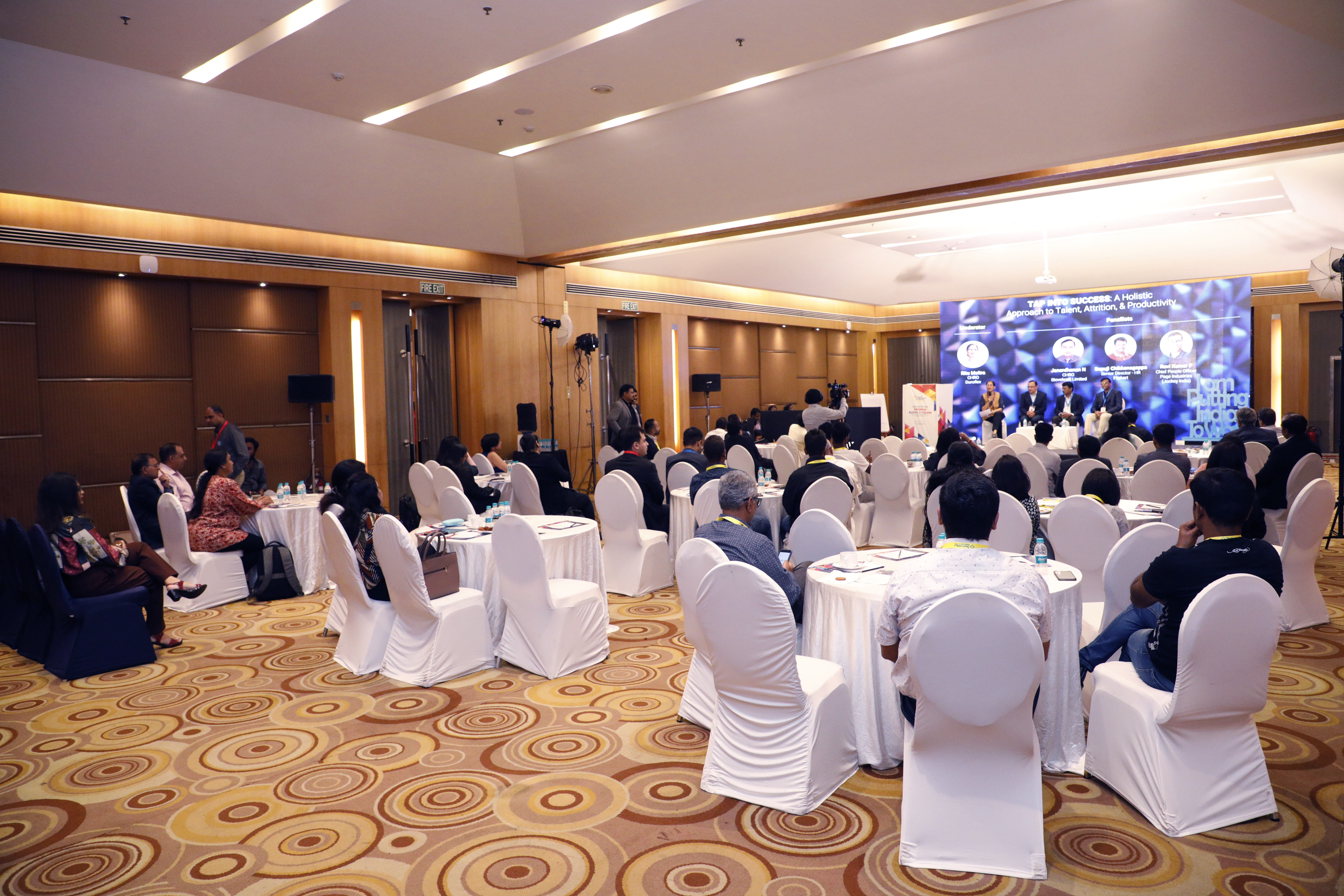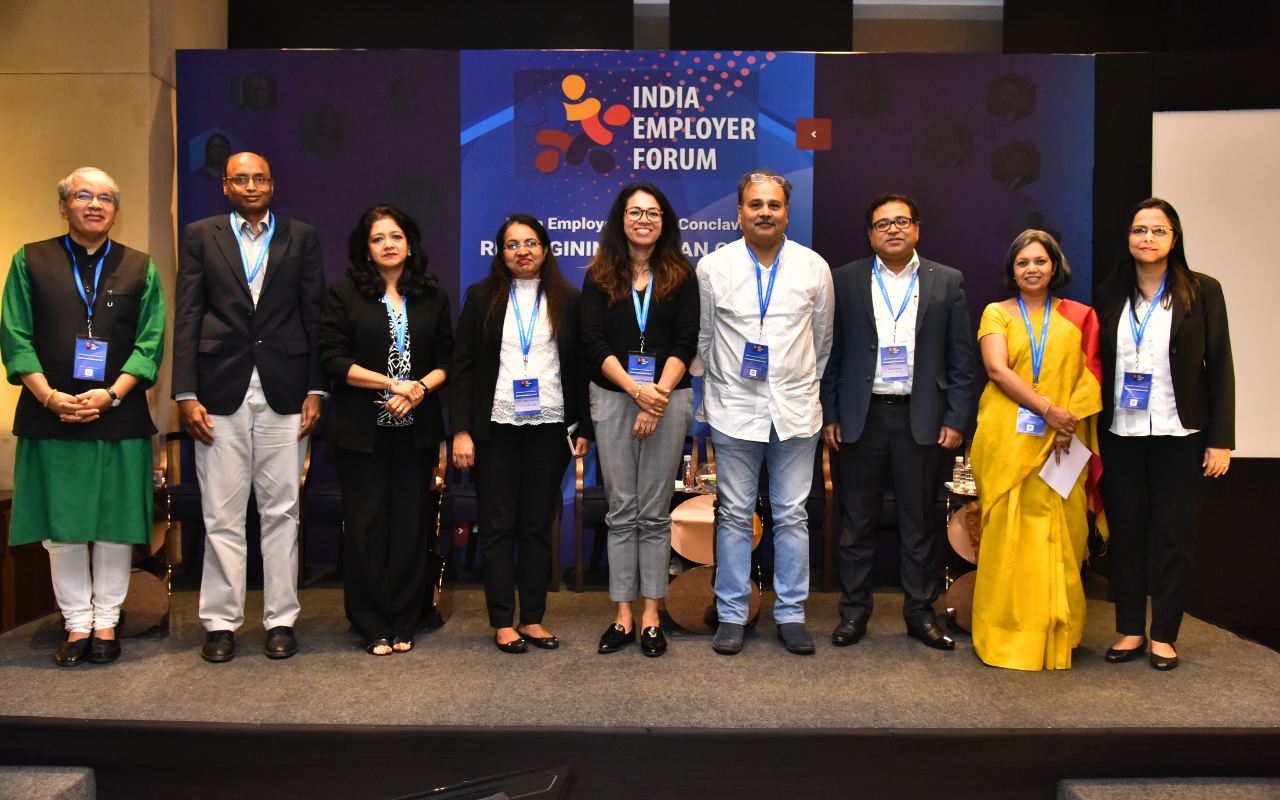The 75th Year of India’s Independence has seen the Nation strive to strengthen its economic status and secure its place as a shining star in the world community. With an estimated GDP of over 7 percent, India is all set to rub shoulders with the major economies of the world. However, our ability to achieve these milestones depends on creating the conditions necessary for sustained growth over the next decade.
We must leverage India’s demographic sweet spot by demystifying the people supply chain to develop a holistic approach towards tapping talent to boost productivity, transform our human capital to enhance their skill expertise, and arrive at the magic mantra to catapult growth together over the next 10 years. As we delve deep into each of these aspects of the people’s supply chain, we will be able to collectively chalk out a plan to enhance the external competitiveness of the economy and secure India’s place in the sun in the coming decades.
On 16th February, 2024 at The Lalit Ashok Bangalore, India Employer Forum brought together leading experts from various industries to have a focused discussion on how employment trends are changing, and how new regulations are shaping the economy’s response to these changes. These shifts are changing the way people work and what businesses need.

The session started with a keynote address delivered by Kartik Narayan, CEO, TeamLease Services. According to Kartik, “While there is a lot of discussion on hard infrastructure to be built, upon regulations and ease of doing business, I think the level of discussion which is required to be spoken about, especially with respect to people, is not getting the kind of sufficient attention that we expect it to get”.

From left to right: Ritu Bhardwaj Moitra, CHRO, Duroflex, Janardhan N, CHRO, Stovekraft, Bapuji Chikkanagappa, Senior Director – HR, Shadowfax, Flipkart, Ravi Kumar P, CPO,
Page Industries (Jockey India)
The first panel discussion on the topic “TAP into Success: A Holistic Approach to Talent, Attrition, and Productivity” was moderated by Ritu Moitra, CHRO, Duroflex. One of the panellists Janardhanan N, CHRO, Stovekraft Ltd spoke on the merit in adopting a policy that integrates human capital into the core of strategic interventions within an organisation. He said, “I tell my colleagues to demonstrate a willingness to contribute to the business, to people. Ulrich and Brockbank talk about those four aspects of the employee championship. Today, technology is disruptive, it’s a great opportunity. We can standardise a lot of things through technology and I think that motivates me and drives me to come to office.”
Bapuji Chikkanagappa, Senior Director – HR, Flipkart, the second speaker on this panel said, “We can put talent into different segments, maybe skilled, unskilled or maybe different levels of uniqueness of roles they hold and then figure out where will be the ROI, where I should invest in maybe, which talent is most critical for my business and where to put my money on.”
Ravi Kumar P, Chief People Officer, Page Industries (Jockey India) added to this saying, “There are cultural aspects as well which are changing and I think leaving an organisation and then coming back to the same organisation is not looked down upon today. So, attrition by itself may not be such a major issue for business.”

From left to right: Mohan Sitharaman, CHRO, Shadowfax, Nash Narasimhan,
Services Business Leader, HP Store, APJ & EMEA, Surya Omar, VP – People & Culture, T.A.C – The Ayurveda Co., Sridhar Goapalan., Director, Arthur’s Food Company, Samata Balal, CPO, Bewakoof.com, Mrrigank Agarwal, Head Sales HR, Reliance Retail
The second panel discussion was moderated by Mohan Sitharam, CHRO, Shadowfax titled “Transforming Human Capital: Moving Beyond Staff Count to Skill Count”. On challenges being faced with respect to finding skilled professionals and how the gap needs to be bridged, Nash Narasimhan, Services Business Leader, HP Store, APJ & EMEA, HPC Inc. said, “I couldn’t even imagine what the internet was when I joined and I’m still surviving in this era learning AI and I’m still learning. So what is readiness? You don’t look for it at all. You only look for learning capability and that’s the only thing you should look for.”
The second panellist on this topic, Surya Omar, VP – People & Culture, T.A.C – The Ayurveda Co. said, “When I look for who could be job ready, it’s like an ocean. Anybody and everybody can be job ready if they are mentally adapted for it. So, it’s more about the attitude and it’s more about the willingness to learn.”
Sridhar Gopalan, Director, Arthur’s Food Company added to this saying, “The best learning which I have given to my staff or to my team is to lead by example. If I want them to do something, I would just show them. What I’m following is that it comes from the top. Also, being in the food industry, we very specifically have an inhouse quality team and a robust training mechanism taking place”.
Samata Ballal, Chief People Officer, Bewakoof.com said, “It is a pyramid that we are operating in. So, we do require people to join us at the end and we do want to keep our pyramid as huge as possible and that can be possible only if we are able to attract talent who are not only ready based on campus talent, but talent we are ready to invest in, train and hope to retain”.
The final panellist on this topic, Mrrigank S Agarwal, Head Sales HR, Reliance Retail said, “In my view, government institutions and higher education institutions are going to provide just a launchpad for anyone. That is just a starting point which gives them an entry into the corporate world or entrepreneurship at some level in some job.”

From left to right: Balaji Iyengar, Founding Member & CFO, UNext Learning, Chandubhai Virani, FOunder & MD, Balaji Wafers, Kartik Narayan, CEO, teamLease
The 3rd and final panel discussion was on the topic “Consume(r)Evolution and How to Sustain Your Business Now and Next 10 Years”, which was moderated by Kartik Narayan, CEO, TeamLease Services Ltd. On this subject, Chandubhai Virani, Founder and Managing Director, Balaji Wafers said, “There was a dearth of talent and I faced a lot of problems during my initial years. The challenge was to find the right people amidst understanding my consumers and going to the market with the final product.”
To that Balaji Iyengar, Founding Member & CFO, Unext Learning added saying, “Being an entrepreneur, I think most of these guys are getting it right. They know how to grow their business. You just need to identify gaps and fill in. So, this has been my experience and it has changed completely in the last 20 years.”

The panel discussions concluded with a closing note by Balasubramanian A, VP & Business Head, TeamLease. He said, “Gone are the days where education and degrees used to hold centerstage, but education is just vanilla. Going forward, it is just job-relevant skills which are catering more towards outcomes, that’s really going to matter. And again, here we are today, and if anything, it’s just only more relevant now than it was back then. While, of course, there are a lot of things which we couldn’t predict and the world just keeps getting more and more VUCA, but the fundamental things do remain the same as ever and foremost of that is the limitless potential of the human spirit”.
In conclusion, the plethora of commendations received from the audience regarding the calibre of speakers and the pertinence of topics broached further underscores its triumph. The event fostered a dynamic atmosphere of engagement and enlightenment, eliciting an enthusiastic response from participants. Collectively, these outcomes affirm the event’s efficacy in addressing pertinent issues and cultivating meaningful discourse, thereby establishing a precedent for future endeavours of similar level.
Stay tuned for our next event…
To watch the full video click here: IEF Conclave 16th Feb | Keynote Address




